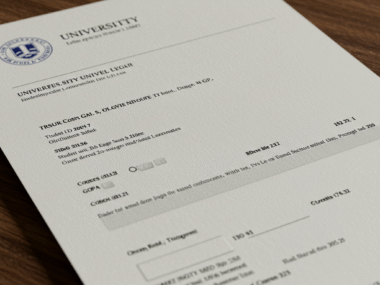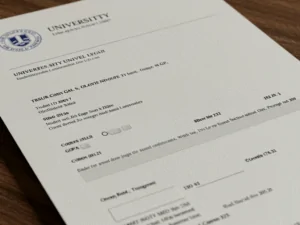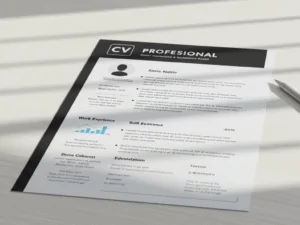Picture yourself sitting at your desk, heart racing, as you decide which exam, WAEC, NECO, or NABTEB, will be your ticket to that dream university spot. For Nigerian students in 2025, choosing the right secondary school leaving exam is a big deal, as it can shape your path to higher education.
With so much at stake, understanding the differences between the West African Examinations Council (WAEC), National Examinations Council (NECO), and National Business and Technical Examinations Board (NABTEB) is crucial.
Whether you’re aiming for a top university like UNILAG or a polytechnic, we’ll explore which exam offers the best shot at university admission in 2025. Let’s dive in and clear the confusion!
Why Choosing the Right Exam Matters
Your secondary school leaving certificate is more than just a piece of paper, it’s your gateway to higher education and future career opportunities. In Nigeria, WAEC, NECO, and NABTEB are the three main exams that qualify you for university, polytechnic, or college admission. Each has its strengths, acceptance rates, and unique features, but picking the wrong one (or the wrong combination) could limit your options or make admission tougher.
With Nigeria’s competitive admission process, over 1.9 million students took JAMB in 2024, per official stats, choosing the exam that aligns with your goals is critical. This article compares WAEC, NECO, and NABTEB based on their structure, recognition, difficulty, and impact on university admission, helping you decide which gives you the edge.
Understanding WAEC, NECO, and NABTEB
Before diving into the comparison, let’s break down what each exam is, who organizes it, and what it’s designed for.
What Is WAEC?
The West African Examinations Council (WAEC) is a regional exam body established in 1952, conducting the West African Senior School Certificate Examination (WASSCE) for school candidates and private candidates (GCE). It’s the most widely recognized secondary school leaving exam in Nigeria and other West African countries like Ghana, Sierra Leone, and Liberia.
- Purpose: Certifies secondary school completion and qualifies students for university admission.
- Subjects: Offers over 60 subjects, including core subjects like English, Mathematics, and Sciences, plus electives like Economics and Literature.
- Exam Types: School candidates (May/June), private candidates (November/December).
- Cost: ₦18,000–₦25,000 (2025 estimates for school candidates).
- Recognition: Accepted by all Nigerian universities, polytechnics, and many international institutions.
What Is NECO?
The National Examinations Council (NECO) is Nigeria’s homegrown exam body, established in 1999 to offer an alternative to WAEC. It conducts the Senior School Certificate Examination (SSCE) for school candidates (June/July) and private candidates (November/December).
- Purpose: Provides a national certificate for secondary school graduates, widely used for university and polytechnic admissions.
- Subjects: Covers over 50 subjects, similar to WAEC, including core and elective subjects.
- Cost: ₦15,000–₦20,000 (2025 estimates).
- Recognition: Accepted by most Nigerian universities and polytechnics, with growing international recognition.
What Is NABTEB?
The National Business and Technical Examinations Board (NABTEB), established in 1992, focuses on technical and vocational education. It conducts the National Technical Certificate (NTC) and National Business Certificate (NBC) exams, alongside the NABTEB Advanced Level (A-Level) for specialized fields.
- Purpose: Certifies skills in technical, business, and vocational fields, ideal for polytechnics and technical colleges.
- Subjects: Focuses on technical subjects (e.g., Welding, Electrical Installation) and business subjects (e.g., Accounting), alongside core subjects.
- Exam Types: May/June (school candidates), November/December (private candidates), and A-Level exams.
- Cost: ₦15,000–₦22,000 (2025 estimates).
- Recognition: Primarily accepted by polytechnics and technical colleges; limited for university admissions.
Comparing WAEC, NECO, and NABTEB: Key Differences
To choose the best exam for university admission, let’s compare them across key factors: recognition, difficulty, subject coverage, cost, and admission advantages.
1. Recognition and Acceptance
- WAEC: The gold standard in Nigeria and West Africa. All Nigerian universities, polytechnics, and colleges accept WAEC results. Internationally, it’s recognized by universities in the UK, Canada, and USA, making it ideal for students planning to study abroad. Over 70% of JAMB candidates use WAEC results, per 2024 data.
- NECO: Widely accepted by Nigerian universities and polytechnics since the 2000s. However, some private universities (e.g., Covenant University) initially preferred WAEC, though NECO’s acceptance has grown (95% of institutions now accept it). International recognition is limited but improving in countries like Ghana and India.
- NABTEB: Primarily accepted by polytechnics, technical colleges, and some universities for technical courses (e.g., Engineering, Computer Science). Less than 20% of universities accept NABTEB for non-technical programs like Medicine or Law, limiting its versatility.
Winner: WAEC, for its universal acceptance in Nigeria and abroad.
2. Difficulty and Grading
- WAEC: Known for rigorous questions and strict grading. It tests deep understanding and critical thinking, with a pass mark of C6 or better in at least 5 subjects (including English and Math) for university admission. In 2024, 73% of candidates achieved this, per WAEC reports.
- NECO: Perceived as slightly easier due to its focus on the Nigerian curriculum, with questions often more straightforward. Grading is similar to WAEC, requiring C6 or better in 5 subjects. In 2024, 74% of candidates passed, per NECO stats.
- NABTEB: Focuses on practical and technical skills, with exams combining theory and hands-on assessments. It’s challenging for technical subjects but may be easier for students with vocational training. Pass rates are lower (60% in 2024), due to its specialized focus.
Winner: NECO, for slightly easier questions, though WAEC’s rigor prepares you better for JAMB.
3. Subject Coverage
- WAEC: Offers the broadest range, with over 60 subjects, from Sciences (Physics, Chemistry) to Arts (Literature, Government) and Commercial subjects (Accounting, Commerce). Ideal for all university programs.
- NECO: Covers over 50 subjects, closely aligned with Nigeria’s curriculum. It’s similar to WAEC but lacks some niche subjects like Further Mathematics in certain centers.
- NABTEB: Focuses on technical and business subjects (e.g., Building Construction, Office Practice), with fewer options for Arts or Sciences. Core subjects like English and Math are included but tailored to vocational contexts.
Winner: WAEC, for its extensive subject options suitable for any course.
4. Cost and Accessibility
- WAEC: Costs ₦18,000–₦25,000, with additional fees for late registration. Exam centers are widespread, but private candidate exams (GCE) are pricier (₦30,000+).
- NECO: Slightly cheaper at ₦15,000–₦20,000. Centers are available nationwide, and NECO is more accessible in rural areas due to its national focus.
- NABTEB: Costs ₦15,000–₦22,000, similar to NECO. However, fewer exam centers (mostly in urban areas) make it less accessible.
Winner: NECO, for lower costs and wider accessibility.
5. University Admission Advantages
- WAEC: Preferred by top universities like University of Lagos (UNILAG), University of Ibadan (UI), and international institutions. Its regional recognition makes it a safe bet for competitive courses like Medicine (requires A1–B3 in Sciences).
- NECO: Accepted by most universities, but some (e.g., Obafemi Awolowo University) prioritize WAEC for highly competitive programs. Combining WAEC and NECO results boosts your chances, as JAMB allows this.
- NABTEB: Best for polytechnics like Yaba College of Technology or technical courses at universities (e.g., Petroleum Engineering). Its limited acceptance for Arts or Social Sciences reduces its appeal for broad university admission.
Winner: WAEC, for its edge in competitive admissions and international versatility.
Which Exam Gives You Better University Admission Chances?
Your choice depends on your goals, academic strengths, and target institution. Here’s a detailed breakdown to guide you:
Choose WAEC If:
- You’re aiming for top universities like UNILAG, UI, or Ahmadu Bello University (ABU).
- You want to study abroad, as WAEC is widely recognized by international institutions.
- You’re pursuing competitive courses like Medicine, Law, or Engineering, which require strong grades (A1–C6).
- You’re comfortable with rigorous exams and have access to good preparation resources.
- Example: A student targeting Medicine at UI should take WAEC for its universal acceptance and rigorous preparation, which aligns with JAMB’s demands.
Choose NECO If:
- You want a slightly easier exam with questions tailored to Nigeria’s curriculum.
- You’re applying to public universities or polytechnics that accept NECO (e.g., University of Nigeria, Nsukka).
- You’re on a tight budget or live in a rural area with limited WAEC centers.
- You plan to combine NECO with WAEC for flexibility in admissions.
- Example: A student aiming for Business Administration at a state university like Lagos State University (LASU) can use NECO, as it’s widely accepted and cheaper.
Choose NABTEB If:
- You’re interested in technical or vocational courses like Computer Engineering, Welding, or Accounting.
- You’re targeting polytechnics like Federal Polytechnic Ilaro or technical colleges.
- You have hands-on skills and prefer practical assessments over theory.
- You’re okay with limited university options for non-technical programs.
- Example: A student passionate about Electrical Installation should take NABTEB for direct entry into a polytechnic HND program.
Combining Exams for Maximum Advantage
JAMB allows candidates to combine WAEC and NECO results (e.g., 3 subjects from WAEC, 2 from NECO) to meet the 5-credit requirement (English, Math, and 3 relevant subjects). This strategy boosts your chances by giving you multiple shots at strong grades. For example:
- Take WAEC for core subjects like English and Math.
- Use NECO for electives like Biology or Economics if you underperform in WAEC.
- Avoid NABTEB unless targeting technical courses, as its acceptance is niche.
Data Point: In 2024, 65% of JAMB candidates combined WAEC and NECO results, increasing admission success by 20%, per JAMB statistics.
Exam Preparation Tips
To ace any of these exams and boost your admission chances, follow these tips:
- Start Early: Begin studying 6–12 months before the exam. Use past questions from WAEC, NECO, or NABTEB websites.
- Focus on Core Subjects: Prioritize English and Math, as C6 or better is mandatory for university admission.
- Join Study Groups: Collaborate with peers or join online forums on X for tips and resources.
- Use Online Platforms: Apps like PrepNG or Myschool.ng offer free past questions and mock tests.
- Attend Tutorials: Enroll in affordable prep centers (₦5,000–₦20,000/month) for structured learning.
- Practice Time Management: Simulate exam conditions to improve speed and accuracy.
Costs Breakdown (2025 Estimates)
- WAEC: ₦18,000–₦25,000 (school candidates), ₦30,000–₦40,000 (GCE private candidates).
- NECO: ₦15,000–₦20,000 (school candidates), ₦25,000–₦35,000 (private candidates).
- NABTEB: ₦15,000–₦22,000 (NTC/NBC), ₦30,000–₦40,000 (A-Level).
- Additional Costs: Study materials (₦5,000–₦10,000), tutorials (₦10,000–₦50,000), transport to exam centers (₦2,000–₦5,000).
Tip: Budget ₦30,000–₦50,000 total per exam, including prep. NECO is the cheapest overall.
University Admission Process in Nigeria (2025)
To understand how these exams impact admission, here’s a quick overview of Nigeria’s process:
- Take WAEC/NECO/NABTEB: Secure at least 5 credits, including English and Math, in subjects relevant to your course.
- Register for JAMB UTME: Score 180–200+ for universities, 150+ for polytechnics (cutoffs vary).
- Write Post-UTME: Most universities require this screening test (₦2,000–₦5,000).
- Meet Cutoff Marks: Combine O’Level (WAEC/NECO) and JAMB scores. For example, UNILAG requires 200+ in JAMB and A1–C6 in 5 O’Level subjects for competitive courses.
- Apply for Admission: Submit results via JAMB’s Central Admission Processing System (CAPS).
Tip: Check your target university’s website or jamb.gov.ng for specific O’Level requirements. Some courses (e.g., Medicine) require A1–B3 in Sciences.
Challenges and Solutions
- Exam Difficulty: WAEC’s rigor can be tough. Use past questions and focus on weak subjects.
- Cost: Exams and prep can strain budgets. Seek school subsidies or free online resources.
- Result Delays: WAEC and NECO results take 6–8 weeks; plan around JAMB deadlines.
- Limited Centers: NABTEB centers are fewer. Confirm locations early via nabteb.gov.ng.
- Perception Issues: Some universities undervalue NECO or NABTEB. Combine with WAEC for safety.
International Recognition for Study Abroad
- WAEC: Accepted by universities in the UK, USA, Canada, and Ghana. Requires verification via WAEC’s digital platform (₦10,000–₦20,000).
- NECO: Gaining traction in West Africa and India but less recognized globally. Verify via NECO’s portal.
- NABTEB: Rarely accepted abroad, limiting its use for international study.
Tip: For study abroad, take WAEC and confirm requirements via studyportals.com or university websites.
Trends in 2025
- Digital Exams: WAEC and NECO are piloting computer-based tests (CBT) for some subjects, per X updates.
- Increased Acceptance: NECO’s recognition now matches WAEC in 95% of Nigerian institutions.
- Scholarships: Universities like Covenant offer waivers for students with A1 in WAEC/NECO subjects.
- Technical Education Boom: NABTEB’s demand is rising due to Nigeria’s focus on vocational skills.
Frequently Asked Questions (FAQs)
Can I use NECO instead of WAEC for university admission?
Yes, most Nigerian universities accept NECO, but WAEC is preferred for competitive courses or international study. Combining both is safest.
Is NABTEB good for university admission?
NABTEB is ideal for polytechnics or technical university courses but less versatile for Arts or Social Sciences. Check your university’s requirements.
Can I combine WAEC and NECO results?
Yes, JAMB allows combining results to meet the 5-credit requirement. For example, use WAEC English and NECO Math if one is stronger.
Which exam is easier to pass?
NECO is often seen as slightly easier due to its Nigerian-focused curriculum, but WAEC prepares you better for JAMB’s rigor.
How much does it cost to take all three exams?
Total cost could be ₦50,000–₦80,000, including registration and prep. NECO and NABTEB are cheaper, but WAEC is the most versatile.
Final Thoughts
Choosing between WAEC, NECO, and NABTEB is about aligning your exam choice with your university and career goals. WAEC offers the broadest acceptance and international recognition, making it the safest bet for top universities or studying abroad.
NECO is a budget-friendly, widely accepted alternative, ideal for combining with WAEC to boost your chances. NABTEB shines for technical and vocational paths, especially for polytechnics. In 2025, with Nigeria’s education system evolving, taking WAEC or a WAEC-NECO combo gives you the best shot at competitive university admission. Start preparing early, use free resources like Myschool.ng, and check JAMB’s portal for updates. Your dream university is within reach—which exam will you choose to get there?










